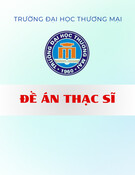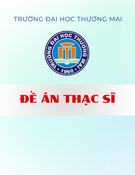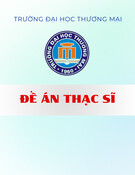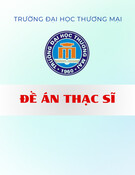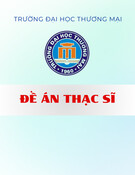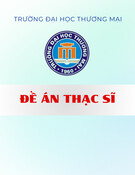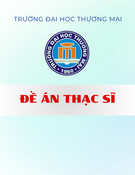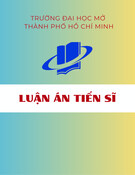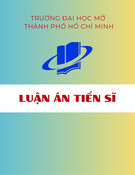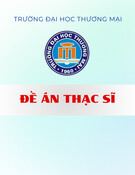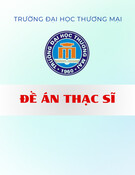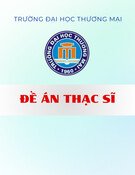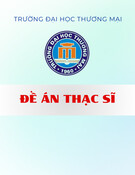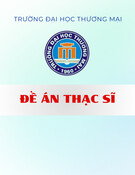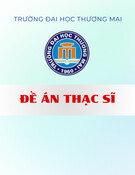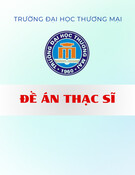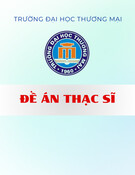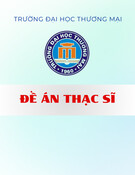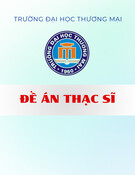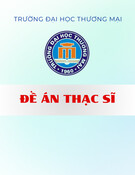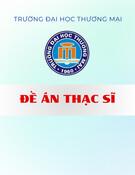
1
INTRODUCTION
1. Reason for topic:
Our Party and State has always paid attention to the human factor,
and care for the development of national human resources, and
human resources departments, all levels, from central to local. In
general social background, the work of the Customs officers always
get the deep concern of the State and the Finance. Tasks completed
on the structure and improve the quality being on top priority, in
which is particularly emphasis on managing workforce in the
localities. This is the workforce that law shall specify on quantity,
structure and especially requirements of quality, consistent with the
requirements and characteristics on Customs field in each localities.
However, localities managing workforce in customs have still many
limitations and shortcomings: Restrict on the qualifications and
capabilities; shortcomings on the requirements of the completion and
fulfill their assigned duties, especially the shortcomings compared
with the requirements of the development of cadres and civil servants
and employees of state and requirements of state management of
customs in the context of integration and modernization of Vietnam
Customs in the current period.
The modernization of the Customs process is putting new
demands on the management of customs, a team of customs officers
and especially the requirements for customs managing workforce,
including customs managing workforce on localities that have a very
important role in the implementation of the customs duties.
Developing a Customs managing workforce in general and local
customs in particular, has not only significance in the industry but also
more important is the contribution of human resources into the task of
state management of national customs, positively contributing to the
national economic development - society.
That is the reason and also the urgency of research project:
“Improving the quality of managing workforce on city,
provincial Customs, in conditions of Vietnam Customs
modernization”.
2. Research objectives and tasks
2.1. Research objectives:
On the basis of systemizing the theoretical issues on managing
workforce and managing workforce’s quality; the topics is focus on
2
investigation, analysis, clarify the status of customs managing
workforce in provinces and cities under central authority; then
propose some solutions to improve the quality of managing
workforce at the cities and provincial customs under central
authority.
2.2. Research Tasks
The tasks is identified in the the research include: (1) Overview
researching of the domestic and foreign quality of managing
workforce. On a theoretical basis for managing workforce, topics
make clarify the concept of customs managing workforce in the
provinces and cities under the Central Government; (2)
Determining the research methodology, then collect and analyze the
survey data, learn conclusions about the quality of localities
customs managing workforce; (3) Learn the causes and issues of
quality as well as improving quality of managing workforce; (4)
propose some solutions and recommendations to improve the
quality of provinces and cities customs managing workforce.
3. Object and scope of research of the thesis
Study subjects of thesis is “quality of managing workforce in the
provinces and cities Customs Department under the Central
Government”.
The scope of the research is determined: (1) space: selecting
research survey in some agencies of key Customs Department; (2)
time: 2010 – 2014; (3) Survey Subjects: The managing workforce
in the provinces and cities of Customs Department under the
Central Government.
4. New contributions of the the thesis
(1) The first, project has clarify the factors affecting provinces and
cities Customs managing workforce and thereby select appropriate
researching model to propose measures to improve quality of
managing workforce. (2) Second, the topics simultaneously
approached to provinces and cities Customs managing workforce
from different perspective: from the perspective of scientific labour
Organization, the administrative perspective and the perspective of
human resources Management and development. (3) Third, topics has
conducted the sociological surveys with questionnaires to collect actual
information from the objects within the research; as a reality basis
illustrated the analysis and evaluation of the quality of provinces and

3
cities customs managing workforce. (4) Fourth, topics conducted to
analyze, clarify the status of quality of provinces and cities customs
managing workforce by qualitative and quantitative methods,
contributing to allowing assessment in more detail, scientific on the
basis of criteria affecting labor quality of customs managing
workforce. (5)Fifth, topics has proposed criteria for competence, skills
and quality of managing workforce, as well as the requirements for
personnel work to develop Customs human resources in terms of
current integration.
5. Meaning of theoretical and reality of the thesis
With codifying the labor theoretical issues, management labor and
quality of customs management labor at the provincial, city Customs
Department, topics have contributions and certain significant with
building and perfecting the system of labor theories, management
labor and quality of management labor.
Topics have contributions and certain significant include: (1) set
out the overall development solution of customs human resources, (2)
specific proposals on capacity building, skills and moral qualities for
managers; and (3) suggestions on personnel issues such as planning
and appointment of staff.
6. The structure of the the thesis
Besides the introduction and conclusion, abbreviations, lists of
references and appendices, survey results, together with the survey,
the thesis includes basic content, is presented under 4 chapters and 18
information.
CHAPTER 1
OVERVIEW OF RESEARCH PROJECTS RELATED TO
THE QUALITY OF MANAGEMENT LABOR OF CUSTOMS
AND RESEARCH METHODS
1.1. Overview of research projects
1.1.1. Studies on human resources
The foreign researchies from the 1990s mentioned contents on
human resource development, human resources and training human
resources in a systematic, especially the US, United Kingdom, Japan
and many other growing countries. Scholars have published the
research to clear the concepts, the impact factor, the research
perspective, the research methodology for developing human
4
resources.
The local scholars were interested in the contents above with
different perspective, such as (1) scientific program of the State level:
“ Vietnamese - aim and motivation of social- economic development”
Prof. Dr. Nguyen Manh Duong as chairman, and (2) The key research in
ministerial level by the National Economics University, done in 2003
with topics “ Knowledge economy with training human resources in
Vietnam on the first decade of the century XXI ”.
1.1.2. Studies of administrative labor
«Managerial labor» is a concept that is being debated currently.
The international research approaches under different views, in which
most concepts are approached from the academic perspective such as
psychology, learning management, sociology, political science or
administration. Summary of this study shows:
First, managerial labor is a peculiar form, performed by
individual, managers, including discovery opportunities, set goals,
forming strategies and plans to use the dark advantages of resources,
including the connection between the members to lead the
organization to achieve its objectives.
Second, managerial labor not only perform the above activities,
but also connecting, encouraging the members of his unit and
perform the proposed plan to achieve its goals.
Third, in the public sector, managerial labor, with an important
role in every public office, also showed a personal touch depending
on the style of management, in particularly the administrative
managing system, and national and regional cultural factors.
1.1.3. The research on the management and development of
officers and employees.
The concept of managerial staff, or more generally as managerial
labor, today already existed through the feudal dynasties. Under the
reign of Le Thanh Tong King, « functionary» is a dual concept, made
up of two elements: Quan and Lai. Today, instead of using the
functionary term, the public administration under the socialist regime
used the officer term, which in this thesis referred to as managerial
officers. Managerial officers in the public sector are understood as
assumed managing positions in public bodies.
Currently, in our country, employees in state agencies in
particular and the political system in general, is: officers, civil

5
servants and public employees. In which, of course, officers is
managerial labor, because officers were elected and held that post
under tenure. But civil servants and public employees are not
managerial labor. Managerial public employees and the civil servants
are appointed to managerial positions..
1.1.4. Research on customs human resources
Through the study of the customs human resources, following
remarks mentioned in the thesis: (1) The research mentions the
important content of the construction of workforce in general.
However, the above works, or just analyze aspects of completed
macroeconomic management, or delve into specific business, and
mentioned the managing factor, human using, but no overall and
systematic research project about assessment of the real situation of
customs human resources manner which is essentially quantitative
methods, but only follow qualitative traditional method (2) until the
present time, there is no scientific projects published on Vietnam
customs managerial labor, particularly local customs managerial
labor.
1.2. The approach
That's interdisciplinary approach from different viewpoint: The
viewpoint of Scientific Labour Organization, human theoretical
perspective, the perspective of human resources developing and the
human resources management in the state administration agency. The
research, applying and use the concepts, tools and research methods from
different perspectives above is necessary for the study object of topic is the
issue of quality and quality improvement of local customs managerial
labor.
1.3. Research Methods
Subject combined Marxism - Leninism methodology and the
specific researching methods include: Analysis of secondary data
method, Survey method using questionnaires, Document analytical
methods. Based on theory and research methods, the author has
developed the following research model:
6
CHAPTER 2
GENERAL THEORETICAL ISSUES ABOUT
MANAGERIAL LABOR AND QUALITY OF
THE LOCAL CUSTOMS MANAGERIAL LABOR
2.1. The basics of labor and management
2.1.1. The basics of labor
Labour is conscious, purposeful activity of human to alter the
natural objects to suit the people’s needs. The concept of labor can be
developed from two aspects of this term: (1) Labor is as an activity;
(2) Labor is as workers.
Workers who provide the working for employers, working prices
are measured in real wages that employers pay for workers.
The social labor division is the specialization producer, each
person produces only one or a certain number of products. The social
labor division is adjusted by limited an individual adaptation to
specific professions.
Labor relations are the relations between workers and employers,
throughout the working process, before signing labor contracts (labor
prior relations), during working (relations in labor) and after the
termination of the labor contract (following labor relations).
Capability of
managerial labor
Quality of
managerial labor
of Customs
Department
Quality of
managerial labor
Skill of
managerial labor
of Customs
Department
The characteristics of the subjects
:
age, gender, qualifications, …

7
2.1.2. The basics of management
Management is an oldest active form, most popular and most
important. Collectively, “Management is a continuous process, in which
people coordinate to used the resources, tools and methods to influence
the objects, in order to achieve certain goals”.
Management process includes fundamental processes: planning,
organization, leadership and inspection, which are the basic functions
of management.
Manager: who led, leader and guide managerial activities for an
organization or a group or a certain object through the use of
resources (human and material resources and financial resources,
knowledge & information) that organization accomplish
predetermined goals. Managers must ensure that the requirements on
management style, the quality, capacity and ability to adapt to
specific conditions and managerial subject.
2.2. Issues on managerial labor and quality of managerial
labor
2.2.1. Managerial labor
Managerial labor is a managerial action of the managers in the
organization, includes the identification of organizational goals,
strategy, plans aimed the goal and leading organizations, promoting
membership in the organization in order to achieve the targets.
Accordingly, managerial labor is based on the division of labor,
first of all, managerial labor is also a kind of labor but are assigned to
the function, assigned to the social workers, assigned internally of
each division. It manipulate energy (labor power) in the management
field, become skill and peculiar to perform a target.
2.2.2. Quality of managerial labor
Quality of labor in general and quality of managerial labor in
particular is the most important factor, to ensure that all activities of
the organization to effectively achieve. That is the result of
managerial labor activity, demonstrated by the quality of the products
that managerial labor activity created; reflects the ability to meet the
managers requirements of individual assigned and contributed to
personal development and the overall work of the organization.
Quality of managerial labor are formed in a managing process,
depending on the quality of the labor activities of managers.
Factors affects quality of managerial labor includes: human
8
resources developing strategic of the organization; labor governance ;
management, human resource development; the opportunity to
develop managerial labor; and quality of current and adjacent
managerial labor.
2.3. Administrative organizations and managerial labor in
state administrative organizations
2.3.1. The basics of state administrative organizations
State administrative organizations is organization in the state
apparatus, which functions exercised executive. The state
administrative organization are organized from the central to local
under different organizational models and ways, depending on each
country. The system of state administrative organization composed to
state administration (public administration)
2.3.2. Managerial labor in state administrative organization
Managerial labor in the state administration organization are
divided into three basic categories: (1) Officials are Vietnam citizens,
elected, approved or appointed to positions and titles terms in the agency
of the Vietnam Communist Party, State, socio - political organizations in
central, province or city under central authority (collectively referred to
as provincial), in districts, towns and cities under provincial (collectively
referred to as district), on the payroll and wage from the state budget.
Civil servants are Vietnam citizens, recruited and promoted to the
rank, position, position in bodies of Vietnam Communist Party, the
State, socio - political organizations, at the central level, provincial
and district level, in agency and units of the People's Army, which is
not the officers, professional army, defense workers; in agency and
units of the People's Police that are not officers, professional soldiers
and in the leadership and management of the public service unit of
the Vietnam Communist Party the State, socio- political
organizations (hereinafter collectively referred to as public service
unit), on the payroll and wage under state budget; for civil servants in
the leadership and management of public business units, the salary from
the salary fund of public service units in accordance with the law.
Public employees are Vietnam citizens, employed under job
placement, in public service unit under the labor contracts regime,
wages from the funds of the public business units in accordance
under the law.
2.4. Quality of local customs managerial labor

9
2.4.1. Assessing the quality of managerial labor
Assessing the quality of managerial labor based on(1)persuant to
the provisions of the law; (2) based on the requirements for managing
workforce; (3) based on the requirements of the management; (4)
based on the results of work; and (5) based on the working resources and
conditions.
2.4.2. Features of the local customs managerial labor
The local customs managerial labor have characteristics: 1) Rule
of law; 2) administrative and service; 3) Synthesizing; 4) the regular
operation; 5) The complexity of profession; 6) The international; 7)
Modernity;
2.4.3. Assessing the quality of customs managerial labor
To assess the quality of managerial labor should be based on the
following specific content: i) Adherence; ii) quality of managing
workforce; iii) quality of management activities; iv) results of
implementation; v) the contribution, vi) quality of internal
governance; vii) development trends.
Besides, to assess the quality of managerial labor should be based
on different methods. For example, using scales to measure the
results of the work of a civil servant, usually have 5 assessed actors:
i) self-assessment of Civil servants; ii) evaluation of colleagues in the
work unit; iii) Assessment of the commander, directly manager; iv)
evaluation of human resource management department, and Evaluation
of competent heads.
2.5. Experience of managing and managerial labor developing
2.5.1. The experience of the French Republic
The experience of the Republic of France is mentioned on the
contents of: (1) Public employees recruited regime in France, based on
two principles: i) The principle of equality: irrespective of their sex,
property, birth, political orientation, religion, culture; ii) Principle
recruited through examinations: public with written and oral form. (2)
French public employees are divided into four categories; Type A is
the university graduate, was appointed leader or high position; Type
B is the people through high school, are the intermediate public
employees,Type C is public office of primary diploma; Category D is
public employees qualified primary, their jobs do not require skilled
or less well-trained. (3) Annually public employees are evaluated to
job performance and their professional ability and upgrading, public
10
employees promotion. (4) Remuneration for France public
employees, including basic wages and allowances, is considered an
important factor to enhance the quality of public employees.
Particularly for training, recruiting officers and public employees
working in the customs service, also has three training form : i) Initial
training; ii) Examinations Training; iii) Training during working.
2.5.2. The experience of Japan
Japanese public employees are very respected by the social, state
regime was very favorably, because Japanese officials are all
excellent people, were recruited through the seriously examination
and the training, continuous training in different positions after
recruits.
Every year, the Japanese Institute of Human Resources (an
independent state agency with the ministries) open 3 exams: exam for
type I officials (senior), exam for type II and type III officials. who
are admitted Type I, will be trained to become leaders in the future.
who are admitted Type II and III, mostly for professional work.
Ethics of Public employees is considered very important in the
quality of public employees in the Japanese. Morality here is the
public-mindedness, integrity and high sense of responsibility, which
was formed through the process of training and rigorous recruitment,
specifically: i) Open competition, fairness regime, so only excellence
person are employed to public officials; ii) public officials living in
the Japanese are guaranteed for all life by the regime for housing,
wages, pensions. iii) The supervision and criticism of society to
public officials very tight, strict making public officials to the utmost
to preserve, caution; iv)Tenure of the leaders in the often very short,
just two years, the structure of public officials has always been
rejuvenating and easily avoid these negative privileges, rents.
Japan made up of wages and increasing mode on the seniority.
Training, development of customs human resources
Customs staffs, officers in Customs Department have high
professional knowledge. The Government of Japan and especially the
Japanese General Administration of Customs is very interested in the
training and retraining of customs staff. Therefore, the officials and
public employees newly recruited, will have to undergo training to
enhance professional skills and professional. Training agency of
customs is the National Customs Academy (Customs Training

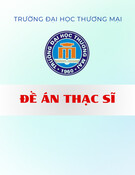
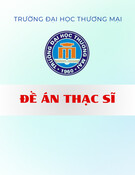
![Đề án Thạc sĩ: Đào tạo nhân lực tại Trường Đại học FPT Hà Nội [Tối Ưu SEO]](https://cdn.tailieu.vn/images/document/thumbnail/2025/20251217/ocmo999/135x160/82801765957089.jpg)
